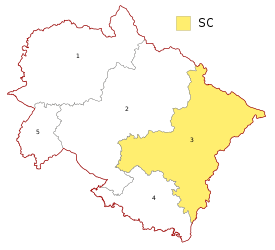Nainital (Lok Sabha constituency)
Nainital Lok Sabha constituency (Hindi: नैनीताल लोक सभा निर्वाचन क्षेत्र) was a Lok Sabha (parliamentary) constituency in Uttarakhand. This constituency came into existence in 1952 and existed until 2009, following the delimitation of Lok Sabha constituencies.
Assembly segments
Before the formation of Uttarakhand
Nainital Lok Sabha constituency comprised the following five Vidhan Sabha (legislative assembly) constituency segments of Uttar Pradesh:
| District | Assembly constituency segments | |
|---|---|---|
| Name | SC/ST | |
| Bareilly | Baheri | |
| Nainital | ||
| Haldwani | ||
| Nainital | ||
| Udham Singh Nagar | ||
| Kashipur | ||
| Khatima | SC | |
After the formation of Uttarakhand
Nainital Lok Sabha constituency comprised the following twelve Vidhan Sabha (legislative assembly) constituency segments of Uttarakhand:
| District | Assembly constituency segments | ||
|---|---|---|---|
| Number | Name | SC/ST | |
| Nainital | |||
| 53 | Dhari | ||
| 54 | Haldwani | ||
| 52 | Mukteshwar | SC | |
| 55 | Nainital | ||
| 56 | Ramnagar | ||
| Udham Singh Nagar | |||
| 59 | Bajpur | ||
| 57 | Jaspur | ||
| 58 | Kashipur | ||
| 63 | Khatima | ST | |
| 60 | Pantnagar–Gadarpur | ||
| 61 | Rudrapur–Kichha | ||
| 62 | Sitarganj | SC | |
Members of Parliament
Keys:
| Election | Member | Party | |
|---|---|---|---|
| 1951–52 | Chandra Dutt Pande | Indian National Congress | |
| 1957 | Chandra Dutt Pande | Indian National Congress | |
| 1962 | Krishna Chandra Pant | Indian National Congress | |
| 1967 | Krishna Chandra Pant | Indian National Congress | |
| 1971 | Krishna Chandra Pant | Indian National Congress (R) | |
| 1977 | Bharat Bhushan | Janata Party | |
| 1980 | Narayan Datt Tiwari | Indian National Congress (I) | |
| 1984 | Satendra Chandra Ghuria | Indian National Congress (I) | |
| 1989 | Mahendra Singh Pal | Janata Dal | |
| 1991 | Balraj Pasi | Bharatiya Janata Party | |
| 1996 | Narayan Datt Tiwari | All India Indira Congress (Tiwari) | |
| 1998 | Ila Pant | Bharatiya Janata Party | |
| 1999 | Narayan Datt Tiwari | Indian National Congress | |
| 2002 (By-election) | Mahendra Singh Pal | Indian National Congress | |
| 2004 | Karan Chand Singh Baba | Indian National Congress | |
gollark: Can I /ignore a bot account somehow?
gollark: that botIS BAD
gollark: Well, I say "What?" a decent amount.
gollark: See, that's particularly annoying, but just unpromptedly replying "ARE YOU DEAF" when you just say "what" is annoying too.
gollark: LASER BEES ACTIVATE
See also
References
- State wise list of MPs (Uttar Pradesh) Archived 22 February 2015 at the Wayback Machine
- State wise list of MPs (Uttarakhand) Archived 22 February 2015 at the Wayback Machine
This article is issued from Wikipedia. The text is licensed under Creative Commons - Attribution - Sharealike. Additional terms may apply for the media files.
